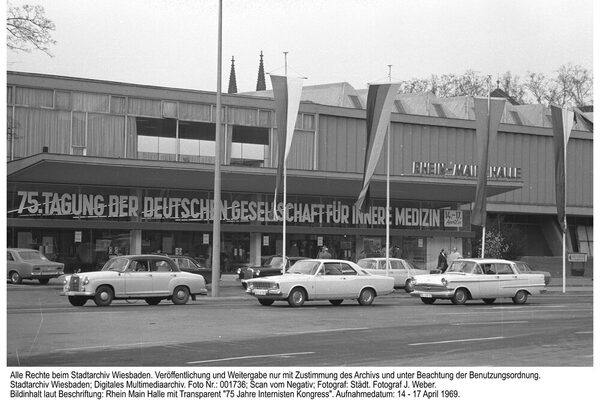German Society for Internal Medicine
The German Society of Internal Medicine (DGIM) was founded in Wiesbaden in 1882 and organizes the annual congress of internists. In 1959, DGIM founded the Professional Association of German Internists, which is also based in Wiesbaden. In 2005, the DGIM established the "German Foundation for Internal Medicine", which supports research projects and awards prizes for outstanding medical and scientific work as well as scholarships. The DGIM is headed by an annually changing chairman, who is also President of the Congress of Internal Medicine.
Over the course of its 125-year history, the DGIM has been chaired by numerous outstanding physicians, many of whose names are still immortalized in medical terms in use today. For example, the Curschmann spirals, a microscopic sign of asthmatic diseases, are named after Heinrich Curschmann, the chairman of the DGIM in 1892. At the DGIM congresses, renowned scientists repeatedly presented their research findings, some of which had revolutionary consequences. In addition to Robert Koch in 1882, the Nobel Prize winner Emil Adolf von Behring, for example, explained his blood serum therapy with antitoxins in 1913, with which the previously often fatal diphtheria could be successfully treated, and reported on the diphtheria vaccination, which was tested for the first time at this time.
Today, with around 20,000 members, the DGIM is one of the largest medical and scientific societies in Europe. According to its statutes, it primarily promotes science and research in the entire field of internal medicine and the transfer of medical research findings into practice and clinical practice. The DGIM awards several prizes at the Congress of Internal Medicine, such as the €30,000 Theodor Frerichs Prize for outstanding clinical-experimental work in the field of internal medicine, named after Friedrich Theodor von Frerich. The DGIM awards the €20,000 Prevention Prize together with the "German Foundation for Internal Medicine" for the best work from German-speaking countries on the prevention of internal diseases. The Gustav von Bergmann Medal honors outstanding scientists whose life's work has had a decisive impact on internal medicine in Germany.
Literature
Schulz, Alexander: Für die Einheit der Deutschen Medizin, 125 Jahre Deutsche Gesellschaft für Innere Medizin e.V., Wiesbaden 2007.
Hiddemann, Wolfgang (ed.): 125 Jahre Internistenkongresse, Munich 2007.
